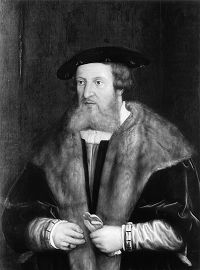Friedrich II, Elector Palatine of the Rhine (1482-1556)
Friedrich II (Frederick), Elector Palatine of the Rhine (Kurfürst von der Pfalz), 1544-1556: born 9 December 1482, the fourth son of Philip der Aufrichtige (the Upright) (1448-1508), Elector Palatine of the Rhine and Margarete of Bavaria-Landshut (1456-1501).
Friedrich, after a frivolous youth, assumed the reign rather late in life when he succeeded his eldest brother Ludwig V (1478-1544), and until his death remained an easygoing man of the world. He was as little able to come to a decision on the great questions of the day as to establish himself politically. He found the more or less excitable citizens of the Palatinate, made up of various elements, in ferment; besides the faithful adherents of the old church there were Lutherans, Zwinglians, and also Anabaptists, especially around Neustadt and Kirrweiler, in the district of Lauterburg and around Stromberg.
Jobst Kinthis of Freinsheim, with his Christliches und trosthaftiges Gesprächbüchlein, so mit etlichen der Wiedertäufer öbristen Rabonen oder Vorsteher gehalten (1553), sought to convince his ruler from the Lutheran point of view, that the Anabaptist doctrines, especially adult baptism, were unscriptural. Among the "Anabaptists" he includes men that have not the least connection with them. "Most of them speak disparagingly of the government and show it no honor. All pretend to be the elect and the just. The Michael Sattlers are the most pious." Just how much this booklet influenced Friedrich is not known. At any rate, many lost their goods and were expelled. But this was mild treatment compared with the ruthless edict of the Diet of Speyer in 1529, passed unanimously by the Catholic and Protestant estates against the Anabaptists. At the Diet of Augsburg in 1555 the Catholic majority, in disregard of the emperor and the pope, granted equal rights to Lutheranism. The elector had vainly demanded freedom of worship for all classes and freedom of conscience for all subjects. His nephew Otto Heinrich established the Lutheran Reformation in the Palatinate, on the whole considerate of the Catholics, the Zwinglians, and also, in spite of severe mandates, of the Anabaptists.
Friedrich died 26 February 1556 and was succeeded as Elector Palatine by his nephew Otto Heinrich.
| Author(s) | Ernst Göbel |
|---|---|
| Richard D. Thiessen | |
| Date Published | April 2007 |
Cite This Article
MLA style
Göbel, Ernst and Richard D. Thiessen. "Friedrich II, Elector Palatine of the Rhine (1482-1556)." Global Anabaptist Mennonite Encyclopedia Online. April 2007. Web. 21 Nov 2024. https://gameo.org/index.php?title=Friedrich_II,_Elector_Palatine_of_the_Rhine_(1482-1556)&oldid=101198.
APA style
Göbel, Ernst and Richard D. Thiessen. (April 2007). Friedrich II, Elector Palatine of the Rhine (1482-1556). Global Anabaptist Mennonite Encyclopedia Online. Retrieved 21 November 2024, from https://gameo.org/index.php?title=Friedrich_II,_Elector_Palatine_of_the_Rhine_(1482-1556)&oldid=101198.
Adapted by permission of Herald Press, Harrisonburg, Virginia, from Mennonite Encyclopedia, Vol. 2, p. 384. All rights reserved.
©1996-2024 by the Global Anabaptist Mennonite Encyclopedia Online. All rights reserved.

